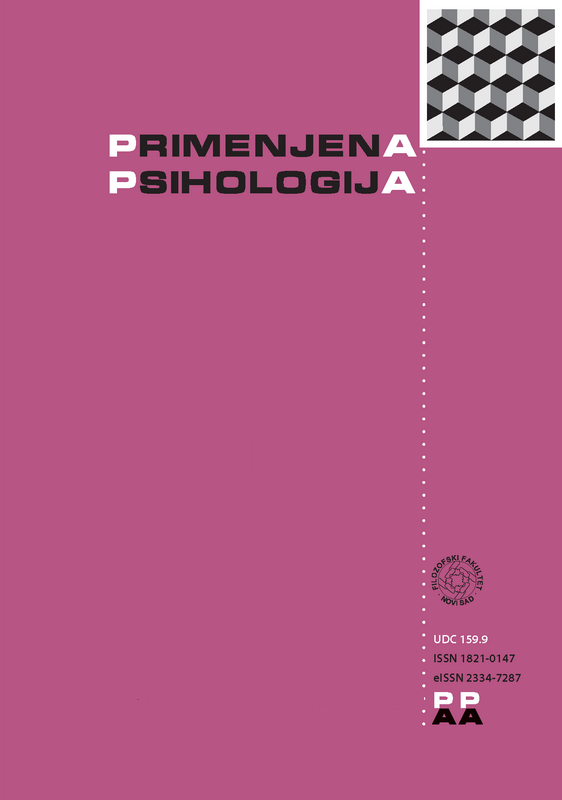INTIMATE RELATIONSHIPS IN CONTEXT: STRESS SPILLOVER, RELATIONSHIP EFFICACY, AND RELATIONSHIP SATISFACTION
DOI:
https://doi.org/10.19090/pp.2017.1.5-16Keywords:
partner relationships, context, stress spillover, relationship efficacy, relationship satisfactionAbstract
Recently, research has shown that stress experienced outside the relationship is negatively associated with relationship outcomes, such as relationship satisfaction. However, the exact mechanisms through which this phenomenon, also known as stress spillover, effects relationships are not completely clarified. Also, most of the studies utilized married couples, and less is known about stress spillover in dating relationships. The aim of this study was to investigate relations between external stress, relationship efficacy, and relationship satisfaction in dating relationships. A total number of 390 men and women, aged from 18 to 35 participated in the study. Our participants were dating for at least six months, but did not live with their partners. The results showed that experiencing greater levels of external stress was associated with lower relationship satisfaction. Both experienced external sources of stress and perceived distress significantly contributed to explaining relationship satisfaction. The results indicated that relationship efficacy mediateed the relationship between experienced and perceived stress and relationship satisfaction. Higher levels of experienced and perceived stress were associated with lower perception of relationship efficacy, which was related to lower relationship satisfaction. Our findings point to the importance of self-regulation processes for relationships outcomes in dating relationships in emerging adulthood. It seems that lower relationship efficacy partly explains the detrimental effects of external stress spillover on relationships.
References
Bandura, A. (1982). Self-efficacy mechanism in human agency. American psychologist, 37, 122–147. doi: 10.1037/0003-066X.37.2.122
Bodenmann, G., & Cina, A. (2006). Stress and coping among stable-satisfied, stable-distressed and separated/divorced Swiss couples: A 5-year prospective longitudinal study. Journal of Divorce and Remarriage, 44, 71–89. doi: 10.1300/J087v44n01_04
Bodenmann, G., & Shantinath, S. D. (2004). The couples coping enhancement training (CCET): A new approach to prevention of marital distress based upon stress and coping. Family Relations, 53, 477–484. doi: 10.1111/j.0197-6664.2004.00056.x.
Bodenmann, G. (1997). Dyadic coping – a systemic-transactional view of stress and coping among couples: Theory and empirical findings. European Review of Applied Psychology, 47, 137–140.
Bowlin, C. (2013). The interaction between relationship satisfaction and perceived stress in graduate psychology students (Unpublished master thesis). Chicago: The Chicago School of Professional Psychology.
Bradbury, T. N., & Karney, B. R. (2010). Intimate relationships. New York: W. W. Norton & Company.
Buck, A. A., & Neff, L. A. (2012). Stress spillover in early marriage: The role of self-regulatory depletion. Journal of Family Psychology, 26, 698–708. doi: 10.1037/a0029260
Cohen, S., Kamarck, T., & Mermelstein, R. (1983). A global measure of perceived stress. Journal of Health and Social Behavior, 24, 385–396. doi: 10.2307/2136404
Fincham, F. D., Harold, G. T., & Gano-Phillips, S. (2000). The longitudinal association between attributions and marital satisfaction: Direction of effects and role of efficacy expectations. Journal of Family Psychology, 14, 267–285. doi: 10.1037/0893-3200.14.2.267
Hill, M. S. (1988). Marital stability and spouses' shared time: A multidisciplinary hypothesis. Journal of Family Issues, 9, 427–451. doi: 10.1177/019251388009004001
Huić, A., Kamenov, Ž., Jelić, M., Mihić, I., & Mihić, V. (2013). Slobodno vrijeme i zadovoljstvo brakom u Hrvatskoj i Srbiji – rodne i generacijske razlike [Leisure time and relationship satisfaction in Croatia and Serbia – gender and age differences]. In I. Jerković & Ž. Kamenov (Eds.), Uloge, stavovi i vrednosti: transgeneracijska perspektiva [Roles, attitudes, and values: Transgenerational perspective] (pp. 73–95). Novi Sad: Faculty of Philosophy Novi Sad.
Jerusalem, M., & Schwarzer, R. (1992). Self-efficacy as a resource factor in stress appraisal processes. In R. Schwarzer (Ed.), Self-efficacy: Thought control of action (pp. 195–213). Washington, DC: Hemisphere.
Lazarus, R. S., & Folkman, S. (2004). Stres, procjena i suočavanje [Stress, assessment, and coping]. Jastrebarsko: Naklada Slap.
Lopez, F. G., Morúa, W., & Rice, K. G. (2007). Factor structure, stability, and predictive validity of college students' relationship self-efficacy beliefs. Measurement and Evaluation in Counseling and Development, 40, 80–96.
Neff, L. A., & Broady, E. F. (2011). Stress resilience in early marriage: Can practice make perfect?. Journal of Personality and Social Psychology, 101, 1050–1067. doi: 10.1037/a0023809
Neff, L. A., & Karney, B. R. (2004). How does context affect intimate relationships? Linking external stress and cognitive processes within marriage. Personality and Social Psychology Bulletin, 30, 134–148. doi: 10.1177/0146167203255984
Neff, L. A., & Karney, B. R. (2009). Stress and reactivity to daily relationship experiences: How stress hinders adaptive processes in marriage. Journal of Personality and Social Psychology, 97, 435–450. doi: 10.1037/a0015663
Neff, L. A. (2012). Putting marriage in its context: The influence of external stress on early marital development. In L. Campbell & T. J. Loving (Ur.), Interdisciplinary research on close relationships: The case for integration (pp. 179–203). Washington: American Psychological Association.
Preacher, K. J., & Hayes, A. F. (2008). Asymptotic and resampling strategies for assessing and comparing indirect effects in multiple mediator models. Behavior Research Methods, 40, 879-891. doi: 10.3758/BRM.40.3.879
Randall, A. K., & Bodenmann, G. (2009). The role of stress on close relationships and marital satisfaction. Clinical Psychology Review, 29, 105–115. doi: 10.1016/j.cpr.2008.10.004
Repetti, R., Wang, S., & Saxbe, D. (2009). Bringing it all back home: How outside stressors shape families' everyday lives. Current Directions in Psychological Science, 18, 106–111. doi: 10.1111/j.1467-8721.2009.01618.x
Repetti, R. L. (1989). Effects of daily workload on subsequent behavior during marital interaction: The roles of social withdrawal and spouse support. Journal of Personality and Social Psychology, 57, 651–659. doi: 10.1037/0022-3514.57.4.651
Shurts, W. M., & Myers, J. E. (2012). Relationships among young adults' marital messages received, marital attitudes, and relationship self-efficacy. Adultspan Journal, 11, 97–111. doi: 10.1002/j.2161-0029.2012.00009.x
Sullivan, T. P., McPartland, T., Price, C., Cruza-Guet, M. C., & Swan, S. C. (2013). Relationship self-efficacy protects against mental health problems among women in bidirectionally aggressive intimate relationships with men. Journal of Counseling Psychology, 60, 641–647. doi: 10.1037/a0033406
Tadinac, M., Kamenov, Ž., Jelić, M., & Hromatko, I. (2005). Što ljubavnu vezu čini uspješnom? [What makes an intimate relationship succesfful?] Izvještaj s XV. Ljetne psihologijske škole [XV. Psychology School Research Report](pp. 11-12). Zagreb: Department of Psychology, Faculty of Humanities and Social Sciences.







